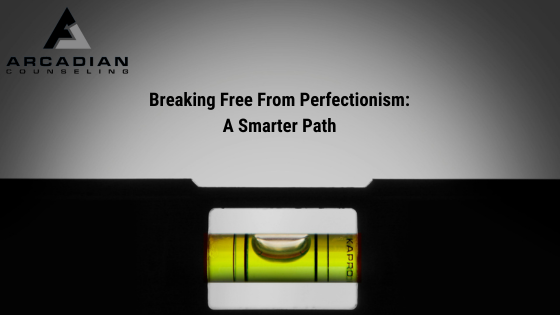You’ve built a career. You’re a provider. A leader. A guy who gets things done.
But if you’re honest with yourself, you might also feel like you’re walking a tightrope – constantly managing pressure, expectations, and the fear of letting something slip.
That tension you feel? That’s perfectionism. And while it may have helped you early in life, chances are it’s wearing you down now.
But there is a better way forward.
When High Standards Become a Heavy Burden
Perfectionism isn’t about wanting to do things well – it’s about needing to do them flawlessly. And it often comes with thoughts like:
- “If I don’t get this right, I’ll let people down.”
- “I’m only as good as my last performance.”
- “There’s no room for error.”
Sound familiar?
You might hear these thoughts at work, but perfectionism doesn’t clock out at 5 p.m. It follows you home, keeping you mentally stuck in to-do lists or robbing you of the ability to fully enjoy your time with family and friends.
The Hidden Cost of Perfectionism

Research shows that perfectionism is often linked to:
- Anxiety and depression
- Chronic stress and burnout
- Low self-worth and relationship struggles
It’s not the pursuit of excellence that causes problems – it’s attaching your identity and self-worth to impossible standards. This is a trap. And it’s one that many successful, driven men fall into without realizing it.
What to Do Instead
Two evidence-based approaches—Acceptance and Commitment Therapy (ACT) and Cognitive Behavioral Therapy (CBT)—offer powerful tools to break out of the perfectionism loop.
🧠 Step Back from the Inner Critic
ACT teaches a practice called cognitive defusion – which is simply learning to notice your thoughts without getting pulled into them.
Instead of:
“I can’t mess this up.”
Try:
“I’m noticing I’m having the thought, ‘I can’t mess this up.’”
This small shift helps you see that you’re not your thoughts – and you can choose how to respond to them.
🔄 Take Imperfect Action
CBT helps challenge rigid, all-or-nothing thinking. You don’t need to have everything perfectly figured out to take a step forward.
Progress beats paralysis. And action builds confidence.
🧭 Reconnect With What Actually Matters
When you stop letting fear and pressure run the show, you can start asking better questions:
- What kind of man do I want to be at this stage of my life?
- What do I want my kids or partner to remember – my achievements, or my presence?
- What matters more to me now: being perfect, or being authentic?
ACT calls this values-driven living. It’s about leading from purpose – not pressure.
Letting Go Doesn’t Mean Letting Down

One of the biggest misconceptions when it comes to perfectionism is: “If I let go, then I’m a failure.”
Letting go of perfectionism doesn’t mean becoming lazy, careless, or mediocre. It means:
- Doing great work without needing it to be flawless
- Leaving work at work so you can actually enjoy being home with your family and friends
- Being a good enough dad or partner, without obsessing over every detail
- Letting others support you, instead of always carrying the load alone
This is what emotional flexibility looks like. And it’s something that can be built.
You’ve Already Proved You Can Perform. Now What?
If you’ve spent decades proving yourself, it’s worth asking:
What kind of man do I want to be from here on out?
You’ve already shown you’re capable. But now it’s about being present, grounded, and connected. Not just living life well – but living it fully.
Let’s Connect
I work with high-functioning, high-achieving men who are ready to let go of impossible standards and build something more sustainable, meaningful, and real.
If you’re tired of chasing a moving target and ready to show up for your life – personally and professionally – let’s connect.
James Killian, LPC is the owner of Arcadian Counseling, a private practice in Greater New Haven, CT, specializing in helping over-thinkers, high achievers, and perfectionists reduce stress, increase fulfillment, and enhance performance — so they can move From Surviving to Thriving. He primarily works with professional men navigating high-pressure careers and meaningful life transitions. His approach blends psychological insight with real-world experience to support men in reclaiming clarity, strength, and purpose.

